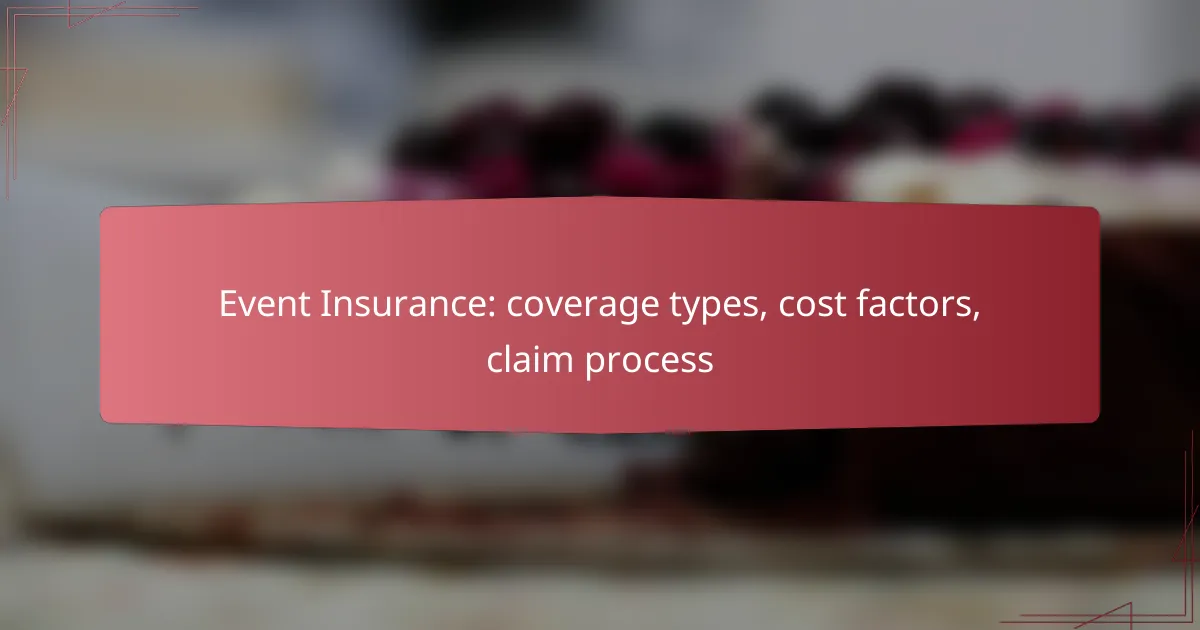Event insurance is essential for organizers in the UK, offering various coverage types tailored to the unique risks of hosting events. The cost of these policies can fluctuate based on factors such as event type, coverage limits, and location, typically ranging from a few dozen to several hundred pounds. Familiarity with the claim process, which includes notifying your insurer and submitting required documentation, is crucial for ensuring a smooth and efficient resolution in case of an incident.
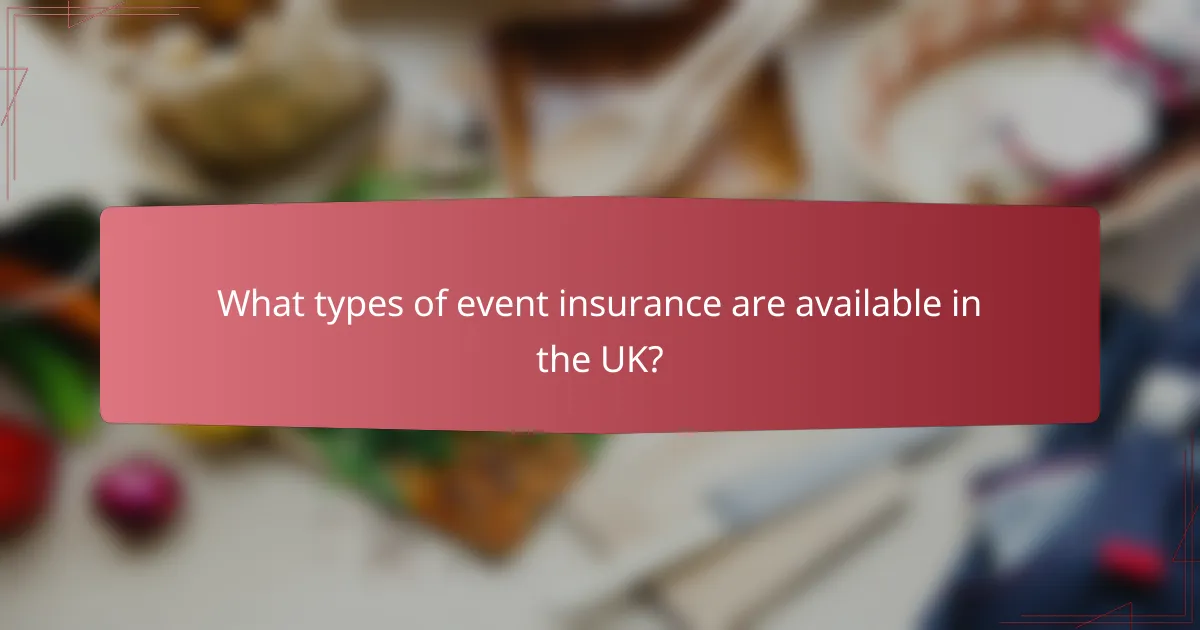
What types of event insurance are available in the UK?
In the UK, various types of event insurance cater to different risks associated with hosting events. Each type provides coverage for specific scenarios, helping event organizers mitigate potential financial losses.
General liability insurance
General liability insurance protects event organizers from claims related to bodily injury or property damage during an event. This coverage is essential for safeguarding against lawsuits that may arise from accidents involving attendees or vendors.
When selecting a policy, consider the size and nature of your event. Coverage limits typically range from £1 million to £5 million, depending on the event’s scale and associated risks.
Cancellation insurance
Cancellation insurance covers financial losses if an event is canceled or postponed due to unforeseen circumstances, such as illness, venue issues, or other emergencies. This type of insurance is crucial for recovering costs associated with non-refundable expenses.
When purchasing cancellation insurance, review the policy’s terms carefully, as some may only cover specific reasons for cancellation. Premiums often vary based on the event’s size and the total insured amount.
Weather insurance
Weather insurance provides coverage for financial losses resulting from adverse weather conditions that could disrupt an outdoor event. This can include rain, snow, or extreme temperatures that lead to cancellations or reduced attendance.
Policies typically specify the weather conditions covered and may require a forecast to trigger a claim. Costs can vary widely, but expect to pay a percentage of the total event budget for adequate coverage.
Equipment insurance
Equipment insurance protects against loss or damage to equipment used during the event, such as sound systems, lighting, and staging. This coverage is vital for event organizers who rent or own expensive gear.
When considering equipment insurance, assess the total value of your equipment and choose a policy that covers replacement costs. Premiums are generally based on the value of the insured items and the associated risks.
Participant accident insurance
Participant accident insurance offers coverage for injuries sustained by attendees or participants during the event. This insurance is particularly important for events involving physical activities, such as sports or adventure events.
Policies can cover medical expenses, disability, or even accidental death. It’s advisable to evaluate the types of activities involved and select a policy that provides adequate coverage for potential risks associated with those activities.
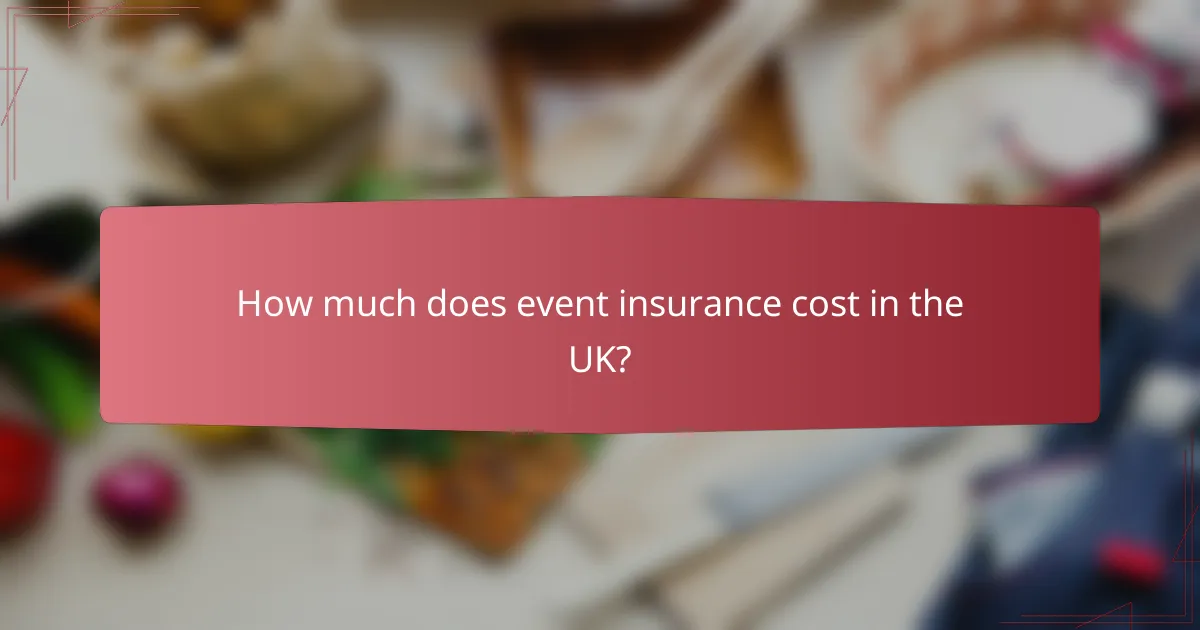
How much does event insurance cost in the UK?
The cost of event insurance in the UK can vary significantly based on several factors, including the type of event, coverage limits, and location. Generally, you can expect to pay anywhere from a few dozen to several hundred pounds for a policy that meets your needs.
Factors affecting cost
Several key factors influence the cost of event insurance. The type of event plays a major role; for instance, weddings may require more comprehensive coverage than smaller corporate gatherings. Additionally, the number of attendees, the venue’s location, and the duration of the event can also impact pricing.
Coverage limits and the specific risks associated with your event are crucial considerations. Higher coverage limits and additional coverage options, such as cancellation or liability insurance, will increase the overall cost.
Average pricing ranges
On average, basic event insurance can start from around £50 for small events and can go up to £200 or more for larger gatherings. For instance, a wedding might typically cost between £100 and £300, depending on the factors mentioned earlier.
For corporate events, prices can vary widely, often ranging from £75 to £500, depending on the complexity and scale of the event. It’s advisable to obtain multiple quotes to find the best coverage for your budget.
Discounts for multiple events
Many insurance providers offer discounts for clients who book coverage for multiple events. If you are planning a series of events, such as a conference followed by a gala, bundling these policies can lead to significant savings.
Always inquire about multi-event discounts when obtaining quotes, as these can reduce costs by a notable percentage. This approach not only saves money but also simplifies the management of your insurance needs.
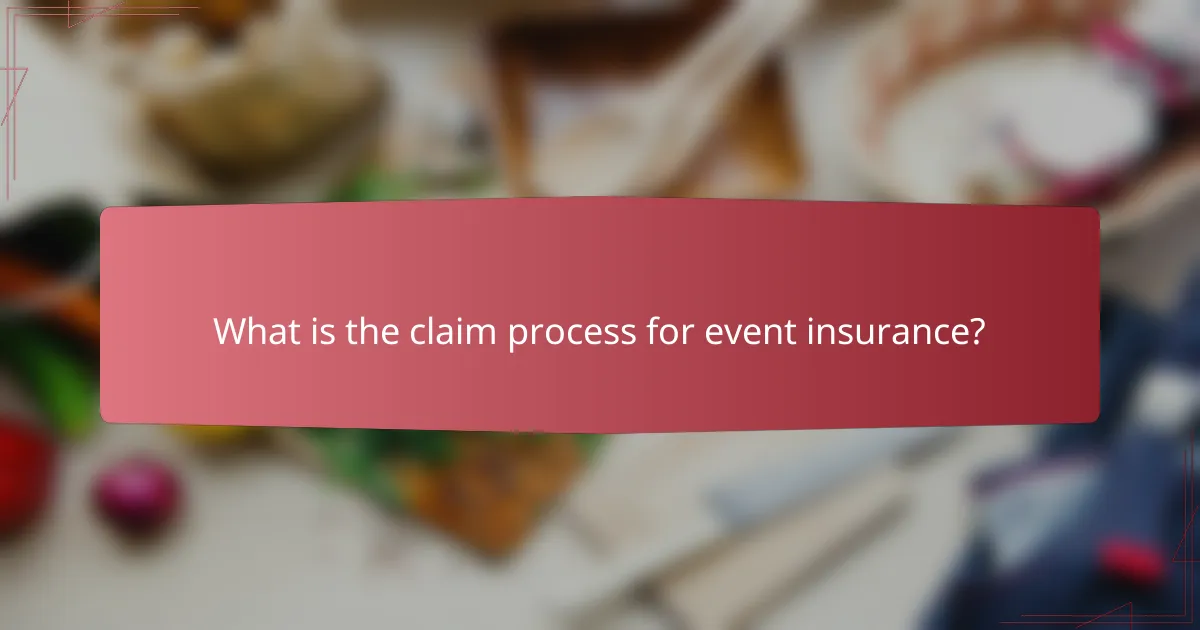
What is the claim process for event insurance?
The claim process for event insurance involves notifying your insurer about the incident, providing necessary documentation, and following specific steps to ensure your claim is processed efficiently. Understanding this process can help you navigate potential challenges and increase your chances of receiving compensation.
Steps to file a claim
To file a claim, start by contacting your insurance provider as soon as possible after the incident occurs. Most insurers have a dedicated claims hotline or online portal where you can initiate the process.
Next, provide a detailed account of the event, including the date, location, and nature of the incident. Be prepared to answer questions and follow any specific instructions from your insurer to facilitate the claim.
Required documentation
Documentation is crucial for a successful claim. Typically, you will need to submit a claim form, a copy of your event insurance policy, and any relevant receipts or invoices related to the loss.
Additionally, photographs of the damage or incident, witness statements, and police reports (if applicable) may be required. Ensure you keep copies of all documents submitted for your records.
Common reasons for claim denial
Claims can be denied for various reasons, including failure to report the incident promptly or not providing sufficient documentation. If the event was not covered under your policy, such as certain types of cancellations, this can also lead to denial.
Another common reason is the lack of compliance with policy terms, such as not following safety protocols or not obtaining necessary permits. Always review your policy to understand the coverage and requirements to avoid pitfalls.

What are the benefits of event insurance?
Event insurance provides essential coverage for various risks associated with hosting events, including financial losses, liability claims, and unexpected cancellations. This type of insurance helps protect event organizers from potential pitfalls, ensuring a smoother experience.
Financial protection
Financial protection is a primary benefit of event insurance, covering costs that may arise from cancellations, postponements, or damages. For instance, if an event is canceled due to unforeseen circumstances like severe weather, the insurance can reimburse non-refundable expenses such as venue deposits and vendor fees.
Costs for event insurance can vary widely, typically ranging from a few hundred to several thousand dollars, depending on the event size, location, and coverage limits. It’s advisable to obtain quotes from multiple insurers to find the best coverage for your budget.
Peace of mind
Having event insurance brings peace of mind to organizers, allowing them to focus on planning and executing the event rather than worrying about potential mishaps. Knowing that you are covered against various risks can significantly reduce stress levels leading up to the event.
Additionally, many venues and vendors require proof of insurance before finalizing contracts. This requirement not only protects you but also reassures all parties involved that risks are managed effectively.
Risk management
Event insurance plays a crucial role in risk management by identifying and mitigating potential liabilities associated with hosting an event. By assessing the specific risks related to your event, such as accidents or property damage, you can tailor your insurance coverage accordingly.
Consider creating a risk assessment checklist to identify potential hazards and ensure you have appropriate coverage. Common risks include equipment failure, attendee injuries, and property damage. Addressing these risks proactively can save you from significant financial losses and legal issues down the line.

What should you consider when choosing event insurance?
When selecting event insurance, consider coverage limits, policy exclusions, and the reputation of the insurer. These factors will help ensure that your event is adequately protected against potential risks and liabilities.
Coverage limits
Coverage limits refer to the maximum amount an insurer will pay for a claim. It’s crucial to assess the potential risks associated with your event and choose limits that adequately reflect those risks. For instance, if you are hosting a large outdoor festival, consider higher limits to cover potential damages or liabilities.
Common coverage limits can range from a few thousand dollars for small events to millions for larger gatherings. Evaluate your event’s specific needs and consult with your insurer to determine appropriate limits.
Policy exclusions
Policy exclusions are specific situations or events that are not covered by the insurance. Understanding these exclusions is vital to avoid surprises when filing a claim. Common exclusions may include acts of God, certain types of property damage, or specific activities deemed high-risk.
Before purchasing a policy, carefully review the exclusions and consider whether additional coverage or endorsements are necessary to protect against potential gaps. This proactive approach can save you from significant financial loss later.
Insurer reputation
The reputation of the insurer plays a significant role in your overall experience with event insurance. Research the insurer’s history, customer reviews, and claim handling process to gauge their reliability and service quality. A well-regarded insurer is more likely to provide prompt and fair claims processing.
Consider seeking recommendations from peers in the event planning industry or checking ratings from independent agencies. This due diligence can help ensure that you choose a trustworthy provider who will support you when you need it most.
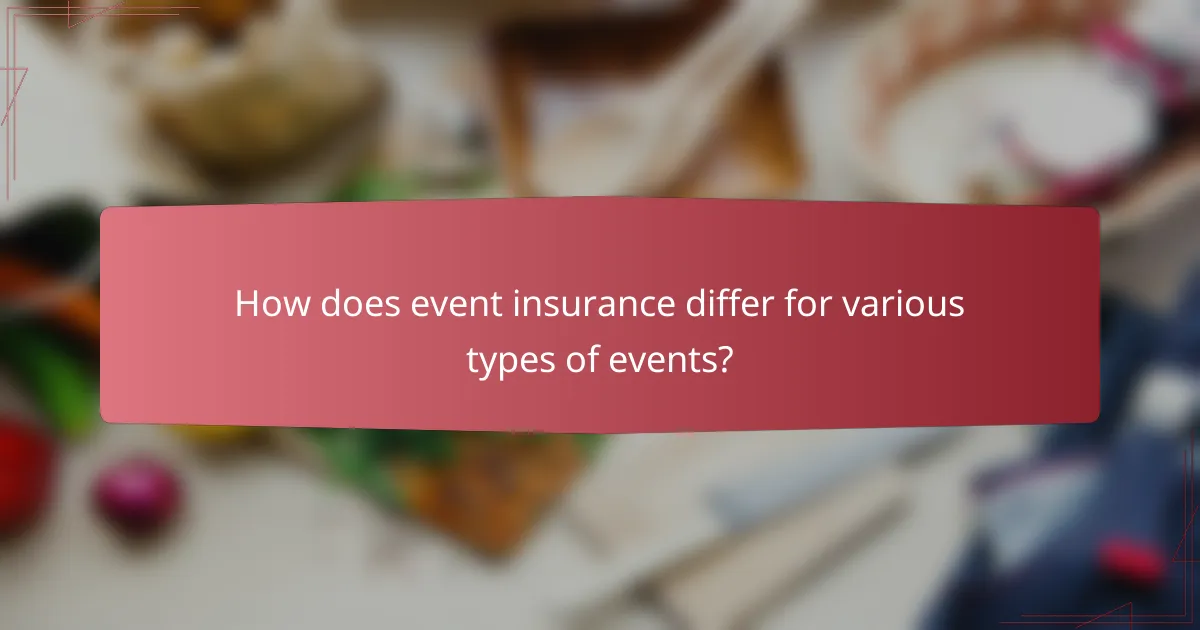
How does event insurance differ for various types of events?
Event insurance varies significantly based on the type of event being held. Different events have unique risks and requirements, which influence the coverage options and costs associated with the insurance policy.
Types of Coverage Available
Event insurance typically includes several types of coverage tailored to specific events. Common options are general liability, cancellation coverage, and property damage. For instance, a wedding might prioritize cancellation coverage due to vendor contracts, while a concert may focus on liability for crowd control.
Additional coverage types can include liquor liability for events serving alcohol, weather insurance for outdoor gatherings, and equipment coverage for events using specialized gear. Understanding the specific needs of your event will help in selecting the right coverage.
Cost Factors for Event Insurance
The cost of event insurance is influenced by various factors, including the type of event, its location, duration, and the number of attendees. For example, a large festival in a major city will generally cost more to insure than a small private party in a rural area.
Other cost determinants include the level of coverage selected and any additional endorsements needed. On average, event insurance can range from a few hundred to several thousand dollars, depending on these variables. It’s advisable to obtain multiple quotes to find the best deal.
Claim Process for Event Insurance
The claim process for event insurance typically begins by notifying the insurer as soon as a loss occurs. Most policies require prompt reporting, often within a specific timeframe, to ensure coverage. Documentation of the incident, including photos and witness statements, is crucial for a successful claim.
After filing a claim, the insurer will review the details and may conduct an investigation. Depending on the complexity, claims can take anywhere from a few days to several weeks to process. Understanding the policy’s terms and conditions can help streamline this process and avoid common pitfalls.
